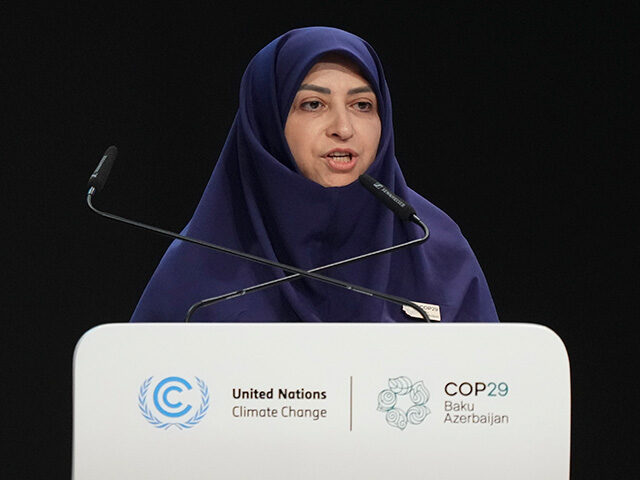Iranian Vice President Shina Ansari used the COP29 climate summit in Baku, Azerbaijan, on Wednesday as a platform to demand sanctions relief for the terrorism-supporting regime in Tehran.
“We hope that (the) international community, free from political issues, will stand together, exchange knowledge, transfer technology and facilitate accessing financial resources without discrimination, and fully lift unilateral sanctions against countries, particularly the Islamic Republic of Iran,” Ansari said on Wednesday.
“However, we cannot forget the fact that the current climate situation of the world is the result of the industrial policies of (a) few developed countries and developing states shall not be deprived of their right to development because of what others have done,” Ansari continued.
“Once again, we emphasize that if this conference should intend to prove its goodwill in striving for a better future for all, while persisting on avoiding double standards to achieve meaningful actions by all countries to achieve these goals,” she said.
Ansari is the head of Iran’s Department of Environment (DOE), in addition to being vice president. She was appointed to the vice presidency on August 22, 2024 by President Masoud Pezeshkian, ostensibly a “moderate” reformer, who scored a surprise victory in the July special election to replace the late President Ebrahim Raisi.
The DOE began in pre-revolutionary Iran as a hunting club and was later concerned primarily with managing parks and wildlife conservation. Later its functions expanded to cover some very real and immediate local environmental crises, such as Iran’s propensity for droughts and water shortages. The agency has long been hobbled by the difficulty of cooperating with Western scientific institutions after the 1979 Islamic Revolution.
In recent years it has been remodeled into a sort of embassy to the climate change movement, a difficult assignment given that Iran is a petro-state that wants to increase its fossil fuel output and is also a brutal theocracy that does not tolerate environmental activism. One of Tehran’s major complaints about U.S. sanctions is that they interfere with profits from the oil industry.
According to the International Monetary Fund (IMF), Iranian oil production increased by 500,000 barrels per day (bpd) last year, a growth of about 15 percent in production, Iranian oil production increased by over 10 percent every year for the past four years.
Ansari’s complaint that “the current climate situation of the world is the result of the industrial policies of a few developed countries” is standard climate alarmist cant, repeated by every nation outside the G7 group of advanced economies. Every developing nation insists that the entire burden of dealing with climate change must be borne by North America and Europe, even though the world’s worst polluters are China and the members of the BRICS bloc of developing nations dominated by Beijing.
Anyone who still cares about actual environmental science should reject this line of thinking wholeheartedly, because it is physically impossible for the Western world to do everything the Paris climate agreement demands.
Some attendees at this year’s COP29 have been calling out such climate hypocrisy, most notably the host of the conference, Azerbaijan. Azeri President Ilham Aliyev sparked a firestorm of controversy at COP29 with his keynote speech on Tuesday, in which he defended his country’s oil industry and said fossil fuel deposits are a “gift from God” that every nation has a right to exploit. Azerbaijan’s current oil output is 620,000 barrels per day, which is about a fifth of Iran’s.

COMMENTS
Please let us know if you're having issues with commenting.